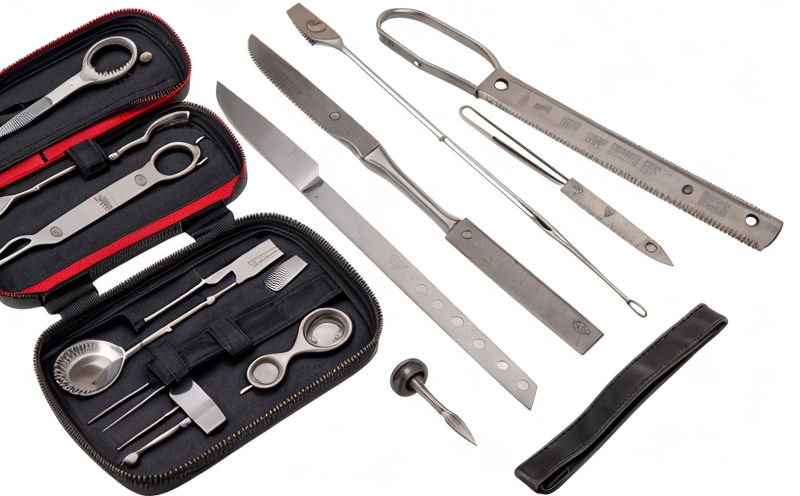Ratchet Lock Mechanism Testing for Clamps and Forceps
The ratchet lock mechanism is a critical component of surgical clamps and forceps. Ensuring its reliability and safety is paramount in the medical device testing sector, as it directly impacts patient health and surgeon confidence during procedures. This section outlines the comprehensive testing methodologies employed by Eurolab to ensure the robustness and integrity of these mechanisms.
The ratchet lock mechanism operates on a simple yet essential principle: it allows for precise control over the opening and closing of clamps and forceps, ensuring that they can be securely locked into position. This is especially crucial during surgical procedures where precision and safety are non-negotiable factors. The design must withstand high loads without compromising its function or integrity.
Our testing protocols encompass a range of parameters to evaluate the mechanical performance, durability, and reliability of ratchet lock mechanisms. These include:
- Load Testing: This involves applying defined loads to simulate real-world surgical conditions. The mechanism must withstand these forces without failure.
- Cyclic Loading: A series of repetitive load applications to assess the durability and fatigue resistance of the ratchet lock mechanism over time.
- Locking Mechanism Integrity: Ensuring that the locking mechanism remains intact under sustained loads, preventing any unintended unlocking during critical moments.
- Surface Finish Inspection: Checking for any imperfections or defects on the surface of the ratchet lock, which could affect its longevity and performance.
The testing apparatus used includes specialized fixtures designed to mimic the stresses encountered in surgical environments. These fixtures are calibrated according to international standards such as ISO 15843:2016 for medical devices. Our engineers perform detailed inspections using optical microscopes and other non-destructive testing methods to ensure that every aspect of the ratchet lock mechanism meets stringent quality criteria.
The acceptance criteria for these tests are based on industry best practices and regulatory requirements, ensuring that only mechanisms meeting or exceeding specified standards are approved for use in surgical instruments. This rigorous approach guarantees that healthcare providers can trust the reliability and safety of the devices they employ.
Eurolab Advantages
At Eurolab, we pride ourselves on offering unparalleled expertise in medical device testing services. Our comprehensive capabilities are further enhanced by our commitment to innovation and cutting-edge technology. Here’s how we stand out:
- Experienced Engineers: Our team comprises highly skilled engineers with extensive experience in the field of medical devices, ensuring that every test is conducted with precision and accuracy.
- State-of-the-Art Facilities: Equipped with advanced testing equipment, our laboratories provide an environment where reliability and safety can be thoroughly evaluated.
- Comprehensive Reporting: We offer detailed reports that not only summarize the test results but also provide insights into any potential areas for improvement, aiding in continuous product enhancement.
- Regulatory Compliance: Our services are designed to meet all relevant regulatory standards and requirements, ensuring compliance with international guidelines such as ISO 15843:2016.
- Customer Support: We prioritize customer satisfaction by offering personalized support throughout the testing process, from initial consultation to final delivery of results.
- Continuous Improvement: Our commitment to excellence drives us to constantly refine our processes and methodologies, ensuring that we remain at the forefront of medical device testing.
By leveraging these advantages, Eurolab ensures that clients receive comprehensive, reliable, and compliant test results for their surgical instruments and tools.
Customer Impact and Satisfaction
The impact of our ratchet lock mechanism testing services extends far beyond the laboratory. By ensuring the reliability and safety of these critical components, we significantly enhance patient outcomes and surgeon confidence. Here are some ways in which our service positively influences customers:
- Enhanced Patient Safety: Ensuring that surgical instruments function reliably under stress helps minimize risks associated with device failure during procedures.
- Improved Surgeon Confidence: Reliable clamps and forceps contribute to a smoother operating environment, allowing surgeons to focus on their primary task without distractions or concerns about equipment performance.
- Regulatory Compliance: Meeting regulatory standards ensures that clients can confidently introduce new products into the market while minimizing potential legal risks.
- Cost Efficiency: By identifying and addressing issues early in the development process, clients can avoid costly rework or recalls later on.
- Product Differentiation: Demonstrating a commitment to quality through rigorous testing helps differentiate products in competitive markets.
- Long-term Relationships: Our focus on customer satisfaction fosters long-lasting relationships based on trust and reliability.
The positive feedback we receive from satisfied clients is further testament to the value of our services. Their success stories highlight how our testing ensures that only the highest quality surgical instruments reach clinical use.
Use Cases and Application Examples
The ratchet lock mechanism plays a vital role in various medical devices, particularly those used in minimally invasive procedures. Here are some real-world applications where this mechanism is crucial:
- Arthroscopic Instruments: In arthroscopy, precision and control are paramount. Reliable ratchet locks ensure that clamps can securely hold tissue without causing damage.
- Bone Fixation Devices: For procedures involving bone fixation, such as hip or spine surgeries, the ratchet lock must provide consistent locking to maintain stability during critical moments of surgery.
- Cardiovascular Procedures: In heart valve replacements and other cardiovascular surgeries, the ratchet lock ensures that clamps can securely hold the delicate tissues involved in the procedure.
- Gynecological Instruments: For procedures involving hysterectomy or ovarian removal, reliable locking mechanisms are essential to ensure precision and safety.
- Neurosurgical Tools: In neurosurgery, where accuracy is critical, ratchet locks provide the necessary control and security for clamps used during delicate operations.
- Ophthalmic Instruments: For procedures involving eye surgery, such as cataract removal or retinal detachment repair, reliable locking mechanisms are crucial to maintain precision and stability.
These examples illustrate how the ratchet lock mechanism is integral to various surgical procedures. By ensuring its reliability through rigorous testing, we contribute to the success of these critical medical interventions.





